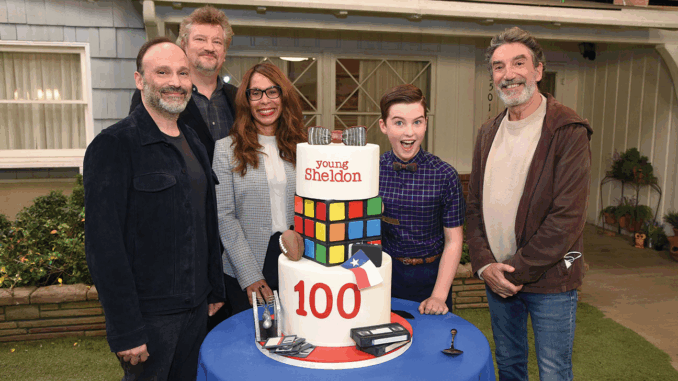
As the family comedy celebrates its centennial, co-creators Chuck Lorre and Steven Molaro talk about their spinoff’s tonal departure from ‘The Big Bang Theory’ — and the cast discusses their favorite episodes.
Chuck Lorre and Steven Molaro have worked together on network sitcoms for the better part of two decades, having each had a hand in the 12 seasons of The Big Bang Theory, the longest-running multicamera comedy in TV history, as well as five seasons of the show’s prequel spinoff series, Young Sheldon.
Lorre, a television titan also known for Two and a Half Men, Mom and The Kominsky Method, started working with Molaro on the first season of Big Bang. At the time, Molaro was a writer for Nickelodeon, with credits on such children’s shows as iCarly, Zoey 101 and Drake & Josh — eventually becoming the series’ showrunner. On Young Sheldon, he again holds that role, overseeing day-to-day, while Lorre keeps a hand in the project from behind the scenes. As Young Sheldon celebrates its 100th episode, THR sat down with the series’ co-creators to discuss how their professional relationship has developed over the years, adapting from multicam to single-cam and what each of them brought to the Big Bang Theory franchise, which has left an indelible mark on the modern television landscape.
How has your working relationship evolved over the years?
STEVEN MOLARO With love, I’ll say that season one of Big Bang was a challenging place to be. I think people know that. It was a little tricky to find your place as one of the younger writers in a room of more established people around you. In fact, Chuck, you know that at the end of season one, I had asked to leave. I was just going to go back to Nickelodeon. But things were starting to click for me a little bit at the end of season one. And you were very gracious and encouraged me to stay and told me you would keep the door open for me to stay as long as possible. And I feel like I didn’t really start cooking until season two. So, I am curious why you wanted me to stay.
CHUCK LORRE I know exactly why: I saw a brilliant writer with a great deal of insight into what we were trying to do. In the beginning, we didn’t know what we were doing. There were an awful lot of dead ends, false starts and arguments over the tone of the show — the nature of the comedy. I was coming from Two and a Half Men, which is pretty rowdy. Risqué. I had to unlearn everything I learned there and start to understand what Big Bang was on its own. It was its own thing, and you were instrumental in helping me get there, to recognize a different kind of show with a different tonality and a different rhythm, different sensibilities. There was a sweetness to it that certainly wasn’t a part of Two and a Half Men.

MOLARO Regarding your concerns about the risqué nature and the transition, there were a couple of slightly risqué early episodes of Big Bang that I think are fantastic.
LORRE Robot hand? Yeah, there were a few we managed to do within the boundaries of what our show was. But one thing you come to understand is, over a certain period of time, the show tells you what it is. You don’t create it so much as you figure out what it wants to be, and take instructions.
Fast-forward to Young Sheldon: What made you decide this was your next project to tackle?
LORRE The beginning was a phone call from Jim Parsons, who sent me a video of his 10-year-old nephew in Texas who is a prodigy — brilliant, extraordinary, off the hook, crazy smart kid. And Jim asked, “Is there anything we can do with this?” I said, “Well, if we wanted to do a show about a young man who is brilliant — a comedy — we have that built into our show. That’s the backstory of Sheldon Cooper.” Over the years of Big Bang, we learned about his mother, we learned about his upbringing in Texas, his sister and brother. We had the backstory in place. It was just a matter of whether to execute it as its own show. It was pretty simple for me. But if Steve had said no, I wouldn’t have done it.
